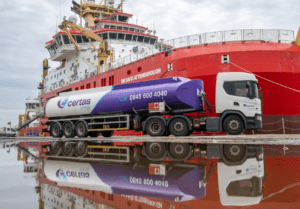British Antarctic Survey launches HVO trial

Emissions from shipping activities account for approximately 60% of the carbon footprint of BAS and transitioning to low-carbon fuels offers a practical and immediate opportunity to decarbonise its marine operations.
By making the switch from conventional diesel to Certas Energy’s HVO, the craft will reduce its carbon emissions by up to 90% instantly.
In addition to emission reduction, HVO offers a number of performance benefits for marine use including zero disruption and seamless integration as a drop-in alternative, a longer shelf life than conventional marine gas oil and improved cold start performance – which is particularly advantageous given the freezing conditions in Antarctica.
The RRS Sir David Attenborough is currently sailing off the coast of Scotland where the BAS team will be testing the renewable diesel to explore the ability to reduce emissions without impacting on operational capability. Following the trials, BAS and the Natural Environment Research Council will determine whether HVO will be adopted more widely.
Sam Garrod, HVO specialist at Certas Energy, said: “HVO is a perfect solution for the marine industry to reduce greenhouse gas emissions and meet their environmental goals without compromising productivity or performance.
“As we continue to support commercial businesses with their energy transition journey, trialling HVO is an effective way to demonstrate the immediate and significant impact this low carbon alternative can have on achieving their net zero ambitions.”
The sustainability and availability of HVO were key considerations for BAS, as well as the cost, logistical and emission implications of using the fuel.



















